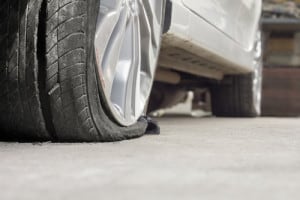
Tire Defect Claims Involving Imported Tires: What You Need to Know
Tire defect claims tend to be complex cases. This largely stems from the fact that determining and proving the nature of the defect can require extensive, meticulous work and possibly the help of experts. When, however, defective tire claims involve imported tires, the complexities may grow, as multiple parties – like the tire manufacturer and the tire importer – can be liable.
At the Amaro Law Firm, our attorneys are skilled at successfully resolving various types of tire defect claims, including those that involve imported tires. Strategic and relentless, we can help you hold all negligent parties accountable if you or a loved one has been harmed by any type of defective tire, regardless of whether it is a domestic or imported tire.
Hurt by a Defective or Faulty Tire?
Call (713) 352-7975, Text (281) 612-8024 or Email Our Firm
for Your FREE, No Obligations Consultation
During your FREE consultation, you can get essential answers and advice regarding your potential claim and the available legal remedies. Free virtual and mobile consultations are available to anyone who cannot visit our offices.
When Imported Tires Are Defective: Who Is Liable?
Various foreign manufacturers sell their tires in the U.S. These tires are brought to dealerships, distributors and others via importers. Because different countries may have the different regulations regarding product safety and testing, U.S. laws dictate that importers are responsible for ensuring that foreign tires meet American safety standards and requirements.
Specifically, these regulations include (and are not necessarily limited to):
- The National Traffic and Motor Vehicle Safety Act 49 (NTMVSA)1 – This law states that “the registered importer shall be deemed to be the manufacturer” of any vehicle or automotive part “that the importer imports or brings [to the U.S.].”
- The Consumer Product Safety Act (CPSA)2 – This law explains that importers hold a “critical position… in protecting American consumers from unreasonably hazardous products made abroad.” Consequently, that Act states that “importers are made subject to the same responsibilities as domestic manufacturers” and that the definition of ‘manufacturer’ includes “any person who manufacturers or imports a consumer product.”
Clearly, the importers of defective tires CAN be liable when the tires they bring to the U.S. are defective and when these faulty tires cause harm. Tire importers, however, may NOT be the only liable parties in these types of claims. The foreign tire manufacturer, dealerships and others may also be liable when imported tires fail and injure consumers.
Tire Importers’ Responsibilities
Federal authorities at the National Highway Traffic Safety Administration (NHTSA) have put together a set of “Recommended Best Practices for Importers of Motor Vehicles and Motor Vehicle Equipment” in order to “reduce the likelihood of noncompliance and defects.”3
These detailed Importer Best Practices include recommendations like (but not limited to):
- Taking “great care” in choosing a foreign tire manufacturer – This can include reviewing design records in order to evaluate potential product risks.
- Inspecting foreign facilities – This quality control practice can verify manufacturing and testing processes, as well as contract compliance.
- Inspecting tires prior to export and/or prior to distribution – Sampling, inspecting and randomly safety testing tires can be an effective way to evaluate post-production quality.
- Setting up a consumer service program – This can involve everything from recordkeeping and consumer education to developing plans for interventions and remedies in the event of a safety recall.
Despite this guidance, however, many importers fail to take the necessary precautions to ensure that the foreign tires they bring to the U.S. are safe and free of any defects that could cause premature failure and traffic accidents.
When Imported Tires Fail & Cause Harm: How Can an Attorney Can Help You
A lawyer can serve as an essential ally when it is time to seek compensation and justice in a tire defect claim that involves imported tires. Some of the various things an attorney can do to help with these claims include:
- Determining all liable parties
- Identifying the available legal remedies and best options for holding the negligent parties accountable
- Explaining your legal options and how to protect your claim moving forward
- Aggressively advocating your rights in any legal setting
Though compensation for these claims can vary (depending on the details of the case), in general, these recoveries can include damages for (but not necessarily limited to):
- Medical bills and treatment costs
- Property damage and repairs
- Lost earnings
- Loss of consortium
- Pain and suffering
- Punitive damages (in some cases, a court may award punitive damages to punish the liable parties for particularly egregious negligence).
Contact a Houston Personal Injury Attorney at the Amaro Law Firm
If you or a loved one has been hurt by an imported tire, it is time to contact a Houston personal injury attorney at the Amaro Law Firm. We are ready to provide you with aggressive advocacy as we help you successfully navigate the road to recovery and justice.
Call (713) 352-7975, text (281) 612-8024 or email our firm for your FREE consultation.
Our attorneys can help you position your tire defect claim for any possible recovery. While we know that compensation can never reverse the permanent losses caused by faulty tires (and other dangerous products), we also know how important financial recoveries can be to seeking treatment and rebuilding lives.
Testimonials from our former clients, along with our 5-star ratings on Google and Facebook, affirm our record of extraordinary service and success in tire defect (and other personal injury) cases.
________________________________________________________________________________
1: Complete text of the NTMVSA
2: Complete text of the CPSA
3: NHTSA Best Practices for Vehicle Importers
